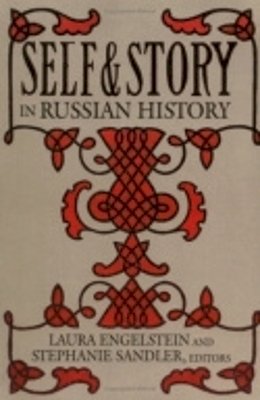
Self and Story in Russian History
Laura Engelstein (Ed.)
Russians have often been characterized as people with souls rather than selves. Self and Story in Russian History challenges the portrayal of the Russian character as selfless, self-effacing, or self-torturing by exploring the texts through which Russians have defined themselves as private persons and shaped their relation to the cultural community. The stories of self under consideration here reflect the perspectives of men and women from the last two hundred years, ranging from westernized nobles to simple peasants, from such famous people as Tolstoy, Dostoyevsky, Akhmatova, and Nicholas II to lowly religious sectarians. Fifteen distinguished historians and literary scholars situate the narratives of self in their historical context and show how, since the eighteenth century, Russians have used expressive genres—including diaries, novels, medical case studies, films, letters, and theater—to make political and moral statements. The first book to examine the narration of self as idea and ideal in Russia, this vital work contemplates the shifting historical manifestations of identity, the strategies of self-creation, and the diversity of narrative forms. Its authors establish that there is a history of the individual in Russian culture roughly analogous to the one associated with the West.
Product Details
About Laura Engelstein (Ed.)
Reviews for Self and Story in Russian History
Lynne Atwood, University of Manchester
American Historical Review
Self and Story is a thought-provoking and complex collection. The contributors... are of a uniformly high quality, generally lively and edifying and always painstakingly researched.... Self and Story offers many rewards. It provides rich empirical justification for the study of the evolution of notions of self, individuality, subjectivity and personality in Russian culture and opens up an exciting new terrain for future research.
Peter Pozefsky
H-Russia
The collection balances out the emphasis on the significance of literary narrative in the formation of the Russian self with its discussions of the opportunities provided by the new media of the early twentieth century, and its studies of testimony, memoir, and private diaries. The volume is important, not only for the breadth of issues it treats, but for its interdisciplinary approach.
Harriet Murav, University of California Davis
Slavic Review
The innovative thinking reflected in the essays owes debts to such sources as psychoanalysis, deconstructionist theory, and the ideas of Michel Foucault.... While some of the essays will appeal mainly to specialists, others... will probably be of broader interest.
Choice
This collection is a valuable addition to the historiography of Imperial and Soviet Russian society. True to its title, Self and Story, the somewhat unorthodox theme allows the authors to explore familiar subjects in new and interesting ways.
Nicole L. Young, University of Toronto
Canadian Slavonic Papars
This volume is a fine and timely intervention in the changing field of Russian cultural history. The editors join their expertise in history, literature, and gender studies to pose a question that recent research on Russian and Soviet social and intellectual history has rendered unavoidable: what was the status of the self in pre- and postrevolutionary Russia, and, equally important, how was the sense of individual identity constructed and produced?
GalinTihanov, Lancaster University
The Russian Review
